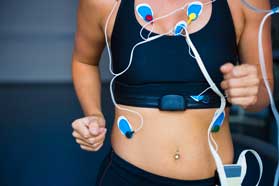Nuclear Exercise Stress Test in Saddle River, NJ

What Is a Nuclear Stress Test?
A nuclear exercise stress test—sometimes called a thallium stress test or nuclear stress test—measures the blood flow to your heart, both in a state of rest and during activity. The test utilizes a radioactive dye to provide your healthcare provider with a better view of the heart. The results of the test can help your practitioner determine the exact cause of certain heart symptoms and provide a more tailored treatment plan based on your unique health needs.
If you suffer from a heart condition and would like to schedule a consultation with a cardiac specialist in Saddle River who specializes in nuclear stress tests, call (201) 806-6099 or contact Medwell Orthopedics & Functional Medicine for Men & Women online.
What Is Involved in a Nuclear Stress Test?
A nuclear stress test can allow your healthcare practitioner to better see the inner workings of the heart, allowing them to determine:
- The size and shape of your heart
- The damage of your heart from previous heart attacks
- If you have coronary artery disease , or blocked arteries
- How effectively your heart pumps blood, also known as ventricular function
- The effectiveness of medical or surgical treatment for pre-existing heart diseases
- How well your coronary arteries deliver blood to the heart, known as myocardial perfusion
A nuclear stress test involves the use of radioactive dyes, exercise and medications to take two sets of images. The presence of these complications are revealed via a radioactive dye injected into the bloodstream during the early stages of the test. The dye is usually thallium or sestamibi—nontoxic substances that will leave your system through the body's digestive system shortly after the test is completed.
To prepare, you cannot eat or drink anything for four hours before the test. Your healthcare provider may request that you prepare in different ways depending on your pre-existing medical conditions:
- If you take medications that have caffeine in them, do not take them 24 hours before the test.
- Do not take the heart medications isosorbide dinitrate, isosorbide mononitrate, nitroglycerin, or dipyridamole.
- If you have asthma, do not take theophylline for 48 hours before the test. You should bring an asthma inhaler to the test though.
- If you have diabetes , ask your healthcare provider how much of your insulin or blood sugar pills you should take before the test, when to take it, and when to eat food. Bring your medication with you to take after the test is finished.
All patients are asked to bring comfortable clothes and walking shoes.
Taking The Nuclear Exercise Stress Test
Capturing both images will take about 15-20 minutes each, and the entire nuclear exercise stress test will take about two to three hours.
During the test, a radioactive dye is injected into a vein in your hand or arm via an intravenous (IV) line, and electrodes are placed on your chest, legs, and arms. These patches connect back to an electrocardiogram, and a cuff on your arm is used to check your blood pressure. It is at this point that your healthcare provider will have you lie on a table, where a gamma ray camera will take the first image to record your heart at rest.
If you are able to exercise, you will be put on a treadmill, initially moving at a walking pace while the incline and speed is slowly increased. If you are not able to exercise, you will be given a medication that will increase your heartrate and simulate exercise. After about 30 minutes of exercising, or when your heartrate has reached a pre-set target, more radioactive dye will be injected into your IV, and the second image will be taken on the same table with the same camera.
Normally, after the exam is finished you can go about your day as usual. Your healthcare practitioner may instruct you to drink plenty of water to help the dye exit your system more quickly. Side effects of a nuclear stress test are unlikely, but include an allergic reaction to the radioactive dye, a flushing sensation, chest pain, difficulty breathing, dizziness, large swings in blood pressure, abnormal heart rhythms and, in extreme cases, a heart attack. If you experience any of these risks associated with nuclear exercising testing, contact your healthcare practitioner immediately.
What Does The Nuclear Exercise Stress Test Show?
If the stress test results indicate that your heart has normal blood flow during rest and exercise, you may not require further tests. However, the nuclear exercise stress test can also show certain indicators of specific heart diseases . Coronary artery disease might show up as abnormal blood flow during exercise, or low blood flow in both images. Signs of a previous heart attack could also be indicated by low blood flow in both images, or by certain areas of the heart not being visible on either set of images due to scar tissue preventing the dye—and blood—from entering those areas. Additionally, a too-large heart could be a sign of other heart complications.
A nuclear exercise stress test might be able to provide you with the answers to your chest pains and other heart-related symptoms. If you would like to have a nuclear stress test in Saddle River, call (201) 806-6099 or contact Medwell Orthopedics & Functional Medicine for Men & Women online. today.
Medwell Orthopedics & Functional Medicine for Men & Women
Address
33 Central AveMidland Park, NJ 07432
(201) 806-6099
www.BergenCountyDoctors.com
Hours
Mon:
8:00 am - 8:00 pm
Tue:
2:00 pm - 7:00 pm
Wed:
8:00 am - 6:30 pm
Thu:
8:00 am - 1:00 pm
Fri:
8:00 am - 6:30 pm
Sat:
9:00 am - 1:00 pm
Sun:
By Appointment Only

